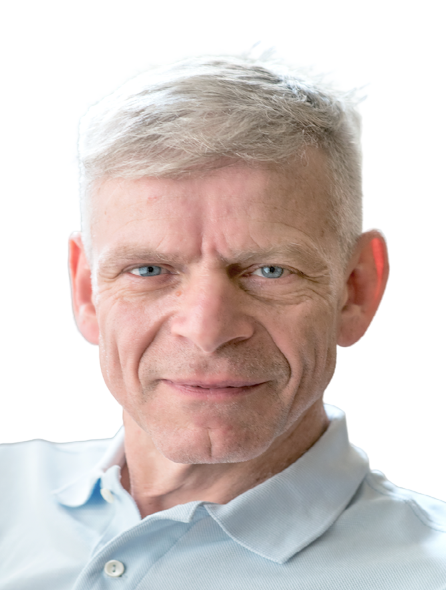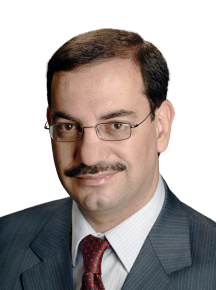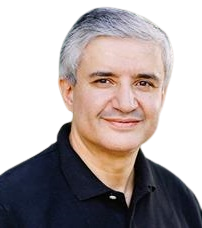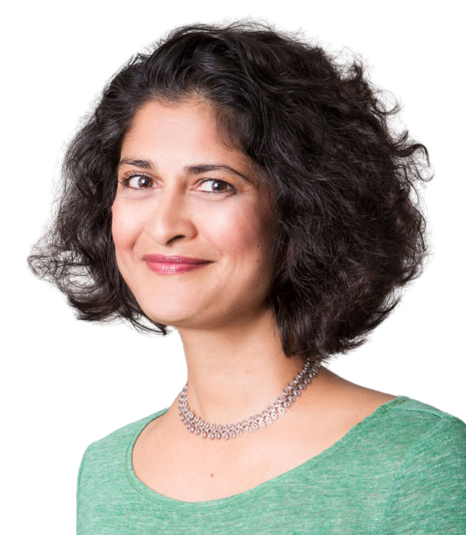 Prof. Laurent El Ghaoui (VinUniversity and University of California,
Berkeley)
Prof. Laurent El Ghaoui (VinUniversity and University of California,
Berkeley)
Title: Representing and Extending Deep Learning via Implicit Models Abstract: In the quest of using machines to predict and learn complex behaviors and situations, deep learning is the rage of the day. Recently, prediction rules based on so-called implicit models have emerged as a new high-potential paradigm in deep learning. These models rely on an "equilibrium" equation to define the prediction, instead of a recurrence through multiple layers. Currently, even very complex deep learning models are based on a "feedforward" structure, without loops, and as such the popular term "neural" applied to such models is not fully warranted, since the brain itself possesses loops. Allowing for loops may be a key to describe complex higher-level reasoning, which has so far eluded the deep learning paradigms. However, the new model raises the fundamental issue of well-posedness, since there may be no or multiple solutions to the corresponding equilibrium equation. In this talk, I will review some aspects of implicit models, starting from a unifying "state-space" representation that enables to connect deep learning with (convex) optimization. I will illustrate these connections via topics such as model compression and robustness; and show that the implicit models have the potential to capture more complex behaviors than current deep learning ones. Biography: El Ghaoui is currently the Dean of Engineering and Computer Science and Vice-Provost for Research and Innovation at VinUniversity, Hanoi, Vietnam. El Ghaoui is on leave from the Department of Electrical Engineering and Computer Science and Department of Industrial Engineering and Operations Research at University of California, Berkeley, where he taught for the past 22 years. He also taught Data Science within the Master of Financial Engineering at UC Berkeley's Haas Business School. In his research, he has contributed to robust optimization, sparse learning, and more recently, deep learning. |
 Prof. Ali H. Sayed (École Polytechnique
Fédérale de Lausanne)
Prof. Ali H. Sayed (École Polytechnique
Fédérale de Lausanne)
Title: Decision-Making over Graphs Abstract: Modern society is witnessing the emergence of complex networked systems driven by exchanges of information among their elements, such as robotic swarms, autonomous systems, social networks, and Internet-of-Things (IoT) architectures. In these applications, data is collected from heterogeneous sources and is generally dispersed across geographic locations. In this context, it is imperative to design learning algorithms that are better suited to the reality of networked units. New methodologies are necessary to account for "coupling" among "intelligent" agents in a manner that respects privacy, enables multi-tasking, promotes fairness, and is robust to malicious interference. Motivated by these considerations, we provide an overview of algorithms for learning and decision-making that exploit important characteristics of social interactions over graphs. We refer to the framework as Social Machine Learning: it handles heterogeneity in data more gracefully, learns with performance guarantees, is more resilient to adversarial attacks, and promotes explainable and fair learning. The framework exploits three properties that are normally missing from existing learning approaches: diversity, decentralization, and group dynamics. Biography: A. H. Sayed is Dean of Engineering at EPFL, Switzerland, where he also leads the Adaptive Systems Laboratory (https://asl.epfl.ch). He has served before as distinguished professor and chairman of electrical engineering at UCLA. He is a member of the US National Academy of Engineering (NAE) and The World Academy of Sciences (TWAS). He served as President of the IEEE Signal Processing Society in 2018 and 2019. His work has been recognized with major awards including more recently the 2022 IEEE Fourier Award, the 2020 IEEE Norbert Wiener Society Award, and several Best Paper Awards. He is a Fellow of IEEE, EURASIP, and AAAS. |
 Prof. Mohamed-Slim Alouini (King Abdullah University of
Science and Technology)
Prof. Mohamed-Slim Alouini (King Abdullah University of
Science and Technology)
Title: Towards Connecting the Remaining 3 Billion Abstract: The role of Internet and Communication Technology (ICT) in bringing about a revolution in almost all aspects of human life needs no introduction. It is indeed a well-known fact that the transmission of the information at a rapid pace has transformed all spheres of human life such as economy, education, and health to name a few. In this context, and as the standardization of the fifth generation (5G) of wireless communication systems (WCSs) has been completed, and 5G networks are in their early stage of deployment, the research visioning and planning of the sixth generation (6G) of WCSs are being initiated. 6G is expected to be the next focus in wireless communication and networking and aim to provide new superior communication services to meet the future hyper-connectivity demands in the 2030s. In addition, keeping in mind that urbanized populations have been the major beneficiary of the advances offered by the previous generations of WCSs and motivated by the recently adopted united nation sustainability development goals intended to be achieved by the year 2030, 6G networks are anticipated to democratize the benefits of ICT and to bring global connectivity in a sustainable fashion in order to contribute to developing tomorrow’s digitally inclusive and green world. In this context, this talk aims to (i) provide an envisioned picture of 6G, (ii) serve as a research guideline in the beyond 5G era, and (iii) go over some of the recently proposed green technologies to offer high-speed connectivity not only in urban environments but also in under-covered areas in order to serve and contribute to the development of far-flung regions. Biography: Mohamed-Slim Alouini was born in Tunis, Tunisia. He received the Ph.D. degree in Electrical Engineering from the California Institute of Technology (Caltech) in 1998. He served as a faculty member at the University of Minnesota then in the Texas A&M University at Qatar before joining in 2009 the King Abdullah University of Science and Technology (KAUST) where he is now a Distinguished Professor of Electrical and Computer Engineering. Prof. Alouini is a Fellow of the IEEE and OPTICA (Formerly the Optical Society of America (OSA)). He is currently particularly interested in addressing the technical challenges associated with the uneven distribution, access to, and use of information and communication technologies in rural, low-income, disaster, and/or hard-to-reach areas. |
 Prof. Urbashi Mitra (University of Southern California)
Prof. Urbashi Mitra (University of Southern California)
Title: Exploiting Statistical Hardness for Increased Privacy in Wireless Systems Abstract: Securing signals from unintended eavesdroppers has become an increasingly important problem with the emergence of the Internet-of-Things. Herein, we examine learning problems in signal processing that are inherently hard without key side information. In particular, we exploit necessary resolution limits for classical compressed sensing problems. To limit an eavesdropper's capabilities, we create an environment for the eavesdropper wherein the appropriate compressed sensing algorithm would provably fail. The intended receiver overcomes this ill-posed problem by leveraging secret side information shared between the intended transmitter and receiver. Two scenarios are considered: one for communication over a wireless channel where a novel block-sparsity based signaling strategy is employed and one for localization where novel structured noise is introduced to degrade the form of the eavesdropper’s channel. In the latter scenario, the transmitter designs a beamformer that introduces spurious paths in the channel without having access to the channel state information. In both cases, the amount of secret information that must be shared is very modest. Theoretical guarantees can be provided for both cases. Proposed algorithms are validated via numerical results. Biography: Urbashi Mitra received the B.S. and the M.S. degrees from the University of California at Berkeley and her Ph.D. from Princeton University. Dr. Mitra is currently the Gordon S. Marshall Professor in Engineering at the University of Southern California with appointments in Electrical and Computer Engineering and Computer Science. She was the inaugural Editor-in-Chief for the IEEE Transactions on Molecular, Biological and Multi-scale Communications. She has been a member of the IEEE Information Theory Society's Board of Governors (2002-2007, 2012-2017), the IEEE Signal Processing Society’s Technical Committee on Signal Processing for Communications and Networks (2012-2016), the IEEE Signal Processing Society’s Awards Board (2017-2018), and the Chair/Vice-Chair of the IEEE Communication Theory Technical Committee (2017-2020). Dr. Mitra is a Fellow of the IEEE. She is the recipient of: the 2021 USC Viterbi School of Engineering Senior Research Award, the 2017 IEEE Women in Communications Engineering Technical Achievement Award, a 2015 UK Royal Academy of Engineering Distinguished Visiting Professorship, a 2015 US Fulbright Scholar Award, a 2015-2016 UK Leverhulme Trust Visiting Professorship, IEEE Communications Society Distinguished Lecturer, 2012 Globecom Signal Processing for Communications Symposium Best Paper Award, 2012 US National Academy of Engineering Lillian Gilbreth Lectureship, the 2009 DCOSS Applications and Systems Best Paper Award, 2001 Okawa Foundation Award, 2000 Ohio State University's College of Engineering Lumley Award for Research, and a 1996 National Science Foundation CAREER Award. Her research interests are in wireless communications, structured statistical methods, communication and sensor networks, biological communication systems, detection and estimation and the interface of communication, sensing and control. |
 Prof. Yonina Eldar (Weizmann Institute of Science)
Prof. Yonina Eldar (Weizmann Institute of Science)
Title: Communication and Sensing: From Compressed Sampling to Model-based Deep Learning Abstract: The famous Shannon-Nyquist theorem has become a landmark in analog to digital conversion and the development of digital signal processing algorithms. However, in many modern applications, the signal bandwidths have increased tremendously, while the acquisition capabilities have not scaled sufficiently fast. Furthermore, the resulting high rate digital data requires storage, communication and processing at very high rates which is computationally expensive and requires large amounts of power. In this talk we consider a general framework for communication and sensing including sub-Nyquist sampling, quantization and processing in space, time and frequency which allows to dramatically reduce the number of antennas, sampling rates, number of bits and band occupancy in a variety of applications. Our framework relies on exploiting signal structure, quantization and the processing task in both standard processing and in deep learning networks leading to a new framework for model-based deep learning. We consider applications of these ideas to a variety of problems in wireless communications, imaging, automotive radar, microscopy and ultrasound imaging and show several demos of real-time prototypes including a wireless ultrasound probe, sub-Nyquist automotive radar, cognitive radio and radar, dual radar-communication systems, super resolution ultrasound and microscopy, and a deep Viterbi decoder. We end by discussing more generally how models can be used in deep learning methods with various applications. Biography: Yonina Eldar is a Professor in the Department of Mathematics and Computer Science, Weizmann Institute of Science, Rehovot, Israel where she heads the center for Biomedical Engineering and Signal Processing and holds the Dorothy and Patrick Gorman Professorial Chair. She is also a Visiting Professor at MIT, a Visiting Scientist at the Broad Institute, and an Adjunct Professor at Duke University and was a Visiting Professor at Stanford. She is a member of the Israel Academy of Sciences and Humanities, an IEEE Fellow and a EURASIP Fellow. She received the B.Sc. degree in physics and the B.Sc. degree in electrical engineering from Tel-Aviv University, and the Ph.D. degree in electrical engineering and computer science from MIT, in 2002. She has received many awards for excellence in research and teaching, including the IEEE Signal Processing Society Technical Achievement Award (2013), the IEEE/AESS Fred Nathanson Memorial Radar Award (2014) and the IEEE Kiyo Tomiyasu Award (2016). She was a Horev Fellow of the Leaders in Science and Technology program at the Technion and an Alon Fellow. She received the Michael Bruno Memorial Award from the Rothschild Foundation, the Weizmann Prize for Exact Sciences, the Wolf Foundation Krill Prize for Excellence in Scientific Research, the Henry Taub Prize for Excellence in Research (twice), the Hershel Rich Innovation Award (three times), and the Award for Women with Distinguished Contributions. She received several best paper awards and best demo awards together with her research students and colleagues, was selected as one of the 50 most influential women in Israel, and was a member of the Israel Committee for Higher Education. She is the Editor in Chief of Foundations and Trends in Signal Processing, a member of several IEEE Technical Committees and Award Committees, and heads the Committee for Promoting Gender Fairness in Higher Education Institutions in Israel. |
 Dr. Hendrik Berndt (Vice-President of the World Wireless Research Forum)
Dr. Hendrik Berndt (Vice-President of the World Wireless Research Forum)
Title: The Road Ahead: Initial Requirements, Key Value and Technological Enablers for 6G Abstract: 6G research is in its early stage. The corresponding global and regional programmes are just at the beginning. A comparison of main players sheds light on the strategic research directions, amongst them the separation of digital, physical, and human worlds. Key technology enablers needed, e.g. for integrating artificial intelligence /machine learning and programmability into the network and flexible networks to enable extreme performance and scalability are described as part of the envisioned 6G ecosystem. Social impact considerations are presented to ensure that acceptance and trustworthiness, societal values at large and sustainability are properly embedded into 6G technology development. This includes a novel linkage between 6G and the united Nations sustainable development goals, both targeted for 2030. The talk includes early considerations of research impact on standardisation. Large stakeholders want to be at the forefront of development and to be seen as pioneers and there are growing concerns about standard fragmentation. Biography: Dr. Hendrik Berndt held various C-level and managerial positions in and operations within the telecom industry in Germany and worldwide. He serves as Vice-president of the Wireless World Research Forum for Europe, Middle East and Africa. Currently he has dedicated himself as Senior Advisor to partners in Asia, the Americas and Europe to contribute to the foundation of the next generation in mobile communication. Center stage take 6G eco-system solutions that serve the bigger global societal ICT challenges. Berndt is advisor to the Association of Radio Industries and Businesses (ARIB) Japan. By now over more than two decades he has been continuously appointed to support the European Commission for establishing next generation mobile communication system research directions, currently with focus on Beyond 5G/6G. From 2015 to 2020 he served as board member of IEEE ComSoc Industry Communities Board, vice-chairing its Special Interest group for 5G. Berndt has been founder of the 2015 established International Institute for Innovation Aysén–Patagonia. There he has been supporting sustainable natural resource exploitation, by applying IoT to develop solutions for environmental issues within the uniqueness of the Chilean region of Patagonia. From 2001 until 2014 Berndt held the position as Chief Technology Officer and Chief Science Officer of DOCOMO's Communications Laboratories Europe, in Munich, Germany. From 2000 to 2010 he has been teaching concurrently as Visiting Professor at the Global Information and Telecommunication Institute, Waseda University, Tokyo, Japan. Berndt was stationed from 1993 until end of 2000 in the USA. During these years he was working within Bellcore, Red Bank, NJ; as Executive Director of Advanced Technology for Global One in Reston, Virginia and held the position as Chief Technology Officer of the TINA-C headquarters in New Jersey. He is author and editor of several books. "Towards 4G Technologies: Services with Initiative" published by John Wiley and Sons has been translated into Chinese and published by China Machine Press. Recent co-authored publications, "6G Vision and Requirements: Is There Any Need for Beyond 5G?", July 2018, IEEE Vehicular Technology Magazine, and the "White Paper on 6G Drivers and the UN Social Development Goals" from April 2020, are directed towards 6G development. |